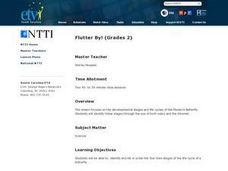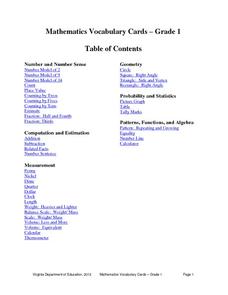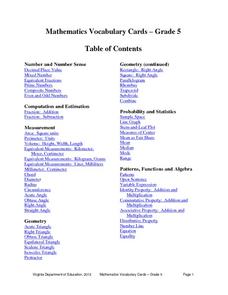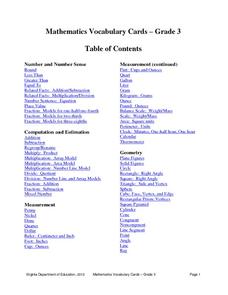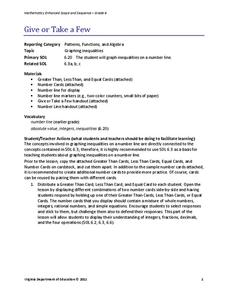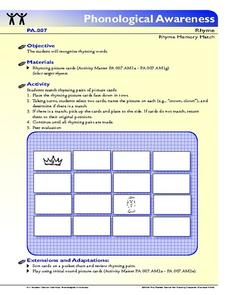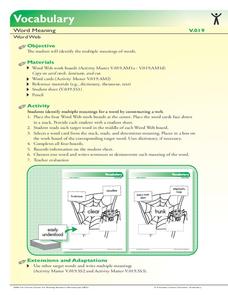Curated OER
Bluebirds
Students use the internet to gather information on bluebirds. In groups, they observe and record the size, color and various sounds of the birds. They view photographs of the birds in different stages of development and discuss how...
Curated OER
Is That a Plan? Problem-Solving: Using Diagrams and Models
Student solve problems using a flow chart. They solve real-world problems by using a diagram or model. They create their own diagrams for problem-solving. They explain how they drew the diagram and solved the problem.
Curated OER
Habitat for Plants! There's No Place Like Home!
Students compare and contrast conditions necessary for survival of aquatic and terrestrial plants, identify common and scientific names of plants,
and determine correlation between location and plant characteristics. Students then use...
Curated OER
Primary Sources and Archaeology in the Study of Ancient Mediterranean Trade
Tenth graders begin the lesson by plotting trade routes, major empires and items traded. Using primary sources, they examine their own values regarding trading items for royality. They participate in a role-play exercise in which they...
Curated OER
Flutter By!
Second graders identify and list the four main stages of a life cycle of a butterfly. In this butterfly lesson plan, 2nd graders use the internet and videos to learn about the life cycle and be able to list them on their own.
Curated OER
Squaring Function of Natural Numbers
Eighth graders complete problems where they use the definition of exponents to expand the squaring function of natural numbers. In this squaring natural numbers lesson plan, 8th graders also identify squares form 0 - 12 and complete a...
Virginia Department of Education
Mathematics Vocabulary Cards - Grade 1
Clarify basic math concepts with a series of vocabulary posters designed for first graders. The cards include illustrations for fractions, place value, tally marks, and number lines, as well as many more vocabulary words.
Virginia Department of Education
Mathematics Vocabulary Cards - Grade 5
Elevate your fifth graders' understanding of math concepts with a series of vocabulary posters. Featuring terms concerning probability and statistics, measurement, algebra, and decimal place value (and many more), the posters are sure to...
Virginia Department of Education
Mathematics Vocabulary Cards - Grade 3
Need to go over some math concepts with your third graders? Use a series of math posters, featuring vocabulary words in geometry, measurement, fractions, probability, and many other areas of study. Each poster presents the term with an...
Virginia Department of Education
Mathematics Vocabulary Cards - Grade 2
Augment your math curriculum with posters detailing several concepts important to second grade math. Each poster features one math term from geometry, measurement, probability and statistics, computation and estimation, numbers and...
Virginia Department of Education
Give or Take a Few
Young mathematicians extend their knowledge of rational numbers on a number line to graph inequalities by first using number cards to compare rational numbers. They finish by using similar reasoning to graph inequalities on a number line.
Florida Center for Reading Research
Phonological Awareness: Rhyme, Rhyme Closed Sort
A rhyming activity challenges scholars to sort picture cards according to their rhyme. Four picture cards line up across the top of a pocket chart. Learners take turns choosing from a face-down stack of picture cards and sort them...
Florida Center for Reading Research
Phonological Awareness: Rhyme, Rhyme Memory Match
Young scholars play a memory-matching game to practice recognizing rhyming words and sounds. With picture cards, they flip over two cards and say the pictures' names. If the pair make a rhyming match, the learner keeps the cards. The...
Florida Center for Reading Research
Phonological Awareness: Phoneme Segmenting, Say and Slide Phonemes
Develop phonological awareness using this partner activity, where scholars segment words into phonemes. Using Elkonin Box picture cards, pairs practice orally segmenting sounds and physically representing the phonemes using counters....
Florida Center for Reading Research
Phonological Awareness: Phoneme Matching, Vowel Picture Sort
Sound sorting can be a fun way to get little ones phonologically prepared for a life of reading. In this activity, learners sort picture cards based on the long or short vowel sound they make when said aloud.
Florida Center for Reading Research
Phonics: Encoding and Decoding, Vowel Stars
Learners are given a star; each star contains a c_c form in the center and vowels on each point. They use the vowels to fill in the blank between the consonants making a simple CVC word. They write each word they make on a piece of paper.
Florida Center for Reading Research
Phonics: High Frequency Words, Memory Word Game
Play this fun adaptation of the game Memory. Young scholars flip over high-frequency word cards, read them aloud, and keep them if they match.
Florida Center for Reading Research
Vocabulary: Word Meaning, Word Web
Explore the multiple meanings of common homographs with this fun language arts activity. Given a series of word webs and a pile of definition cards, pupils complete each web by matching four different definitions to each target word.
Florida Center for Reading Research
Vocabulary Morphemic Elements: Word Dissect
Assist pupils as they learn to separate base words and affixes and combine them to determine the meaning of words. Partners practice with cards that include words with affixes.
Virginia Department of Education
Weather Patterns and Seasonal Changes
Get your class outside to observe their surroundings with a lesson plan highlighting weather patterns and seasonal changes. First, learners take a weather walk to survey how the weather affects animals, people, plants, and trees during...
Florida Center for Reading Research
Phonics: Letter- Sound Correspondence, Brown Bag It
Sorting objects according to their initial sound get scholars thinking about letter-sound correspondence. With 26 brown bags labeled with a letter of the alphabet, learners browse magazines and cut out images that begin with the...
Florida Center for Reading Research
Phonics: Letter-Sound Correspondence, Letter-Sound Pyramid
This fun game is a way to help your littlest learners build strong phonological awareness. Scholars equipped with letter triangles, a stack of picture cards, and counters choose a picture card, say the name of the image, and attempt to...
Florida Center for Reading Research
Phonics: Letter-Sound Correspondence, Letter-Sound Bingo
Young scholars build a strong understanding of medial sounds, vowels, and letter sound correspondence while playing Bingo. Taking turns, peers choose a card and say its name and medial sound; all players look for the vowel on their card....
Florida Center for Reading Research
Phonics: Letter-Sound Correspondence, Medial Phoneme Spin
A collaborative activity challenges young scholars to match medial graphemes and phonemes. Pairs take turns spinning the spinner, naming the letter, and saying its name. They choose from a stack of cards with the same medial sound.






